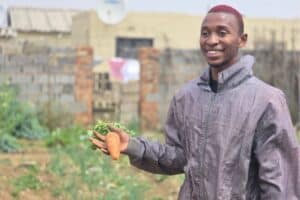Peperomia is a small, colourful and textured foliage plant, originally from tropical Mexico, Central America, and the West Indies.

Here are two misconceptions that gardeners hold onto; that all succulents need full sun and that tropical plants are tender and water-hungry.
The reality is that many succulents do better in semi-shade while tropical plants are among the toughest plants around, provided they are not planted in the blazing sun. And, they are almost as water-wise as succulents.
The misconceptions around tropical plants probably arise from their use as indoor plants, which implies the need for special care.
As garden plants, they stand up to the extremes of rain interspersed with long dry periods, because many are adapted to storing water in their fleshy stems or roots.
Tropical stalwarts include anthuriums, bromeliads, croton, delicious monster (Monstera deliciosa), dracaena, peperomia, philodendron, rubber plant (Ficus elastica), yucca, and ZZ plant (Zamioculcas).
What’s more, many tropical plants produce offshoots, babies or pups, which means that the mother plant can remain indoors while the youngsters can be planted outdoors.
Indoor needs
Being originally forest plants, indoor tropicals cope with good indirect light, and some will even take low light, like the ZZ plant. They should not receive full sun. Also, don’t over-water. Plants can survive an amazing amount of neglect. Let the soil dry out moderately between watering. A spritz of water on the leaves helps with humidity and removes dust. Give them a liquid feed once in spring and again in summer.
Outdoor needs
The ideal position for tropical plants is light dappled shade under trees, which means there is little or no direct sun but good light.
Dig plenty of compost and leaf mould into the soil so that it is fertile and drains well, replicating their natural habitat. Competition from the tree roots means that plants will need feeding. Once established, they will generally be able to survive just on available rainwater.
Try these
ZZ plant (Zamioculcas) looks like a cross between a fern and a cycad but needs far less water. It will add interest to shadier areas of the garden or those with dappled sun. It can take more sun but needs to be acclimatised by first planting in semi-shade and later moving it into the sun. Plant it in well composted, free-draining soil. Keep the shine on the large, green leaves by hosing them down every now and then. Add colour by companion planting it with anthuriums as a border. They also have low water needs.

ZZ plant – lush but with minimal water needs
Delicious Monster (Monstera deliciosa) comes in and out of fashion and once again in the limelight. The huge, lobed leaves add drama and texture to the garden. With some support, plants even scramble up trees. They need the minimum of care, surviving on existing rainfall. Again, they need shade or dappled sun, and space to show off their bold leaves. It will do well with a leafy mulch that imitates the floor of a tropical forest.
Peperomia is a small, colourful and textured foliage plant, originally from tropical Mexico, Central America, and the West Indies. In nature, they are epiphytic, which means they will grow in shallow soil. To make the most of their rich colours, place plants in medium light but not direct sun. Keep the soil moist but don’t overwater or let the soil become waterlogged. From spring to autumn, feed monthly with a liquid fertiliser to encourage new leaves.

Peperomia – good for shallow soil
Did you know?
The supplier of these indoor tropical plants, LGV Plants, is one of 10 growers worldwide to be nominated for International Grower of the Year for 2020?
A major reason for their nomination is their commitment to green energy and reducing their carbon footprint. All the greenhouses are heated by solar (collected onsite), water is harvested from a system of dams, and bicycles, instead of cars, are used to get around the 11ha estate.
The other nominees are from China, Ecuador, Hong Kong, Israel, Kenya, the Netherlands and the United Kingdom and the award will be made at IPM Essen, the world’s leading horticultural trade fair in Germany in January 2020.
For more news your way, download The Citizen’s app for iOS and Android.
Support Local Journalism
Add The Citizen as a Preferred Source on Google and follow us on Google News to see more of our trusted reporting in Google News and Top Stories.






